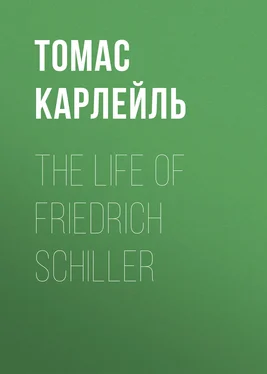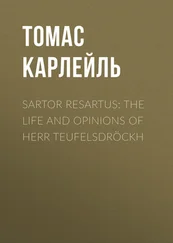Томас Карлейль - The Life of Friedrich Schiller
Здесь есть возможность читать онлайн «Томас Карлейль - The Life of Friedrich Schiller» — ознакомительный отрывок электронной книги совершенно бесплатно, а после прочтения отрывка купить полную версию. В некоторых случаях можно слушать аудио, скачать через торрент в формате fb2 и присутствует краткое содержание. Жанр: Биографии и Мемуары, Философия, foreign_edu, foreign_antique, на английском языке. Описание произведения, (предисловие) а так же отзывы посетителей доступны на портале библиотеки ЛибКат.
- Название:The Life of Friedrich Schiller
- Автор:
- Жанр:
- Год:неизвестен
- ISBN:нет данных
- Рейтинг книги:3 / 5. Голосов: 1
-
Избранное:Добавить в избранное
- Отзывы:
-
Ваша оценка:
- 60
- 1
- 2
- 3
- 4
- 5
The Life of Friedrich Schiller: краткое содержание, описание и аннотация
Предлагаем к чтению аннотацию, описание, краткое содержание или предисловие (зависит от того, что написал сам автор книги «The Life of Friedrich Schiller»). Если вы не нашли необходимую информацию о книге — напишите в комментариях, мы постараемся отыскать её.
The Life of Friedrich Schiller — читать онлайн ознакомительный отрывок
Ниже представлен текст книги, разбитый по страницам. Система сохранения места последней прочитанной страницы, позволяет с удобством читать онлайн бесплатно книгу «The Life of Friedrich Schiller», без необходимости каждый раз заново искать на чём Вы остановились. Поставьте закладку, и сможете в любой момент перейти на страницу, на которой закончили чтение.
Интервал:
Закладка:
'Yet two short years and my whole fortune will be determined. I feel how much I ask, how boldly, and with how little right I ask it. A year is past since this thought took possession of my soul; but my esteem for you and your excellent daughter was too high to allow room for a wish, which at that time I could found on no solid basis. I made it a duty with myself to visit your house less frequently, and to dissipate such feelings by absence; but this poor artifice did not avail me.
'The Duke of Weimar was the first person to whom I disclosed myself. His anticipating goodness, and the declaration that he took an interest in my happiness, induced me to confess that this happiness depended on a union with your noble daughter; and he expressed his satisfaction at my choice. I have reason to hope that he will do more, should it come to the point of completing my happiness by this union.
'I shall add nothing farther: I know well that hundreds of others might afford your daughter a more splendid fate than I at this moment can promise her; but that any other heart can be more worthy of her, I venture to deny. Your decision, which I look for with impatience and fearful expectation, will determine whether I may venture to write in person to your daughter. Fare you well, forever loved by—Your—
'Friedrich Schiller.'Concerning this proposal, we have no farther information to communicate; except that the parties did not marry, and did not cease being friends. That Schiller obtained the permission he concludes with requesting, appears from other sources. Three years afterwards, in writing to the same person, he alludes emphatically to his eldest daughter; and what is more ominous, apologises for his silence to her. Schiller's situation at this period was such as to preclude the idea of present marriage; perhaps, in the prospect of it, Laura and he commenced corresponding; and before the wished-for change of fortune had arrived, both of them, attracted to other objects, had lost one another in the vortex of life, and ceased to regard their finding one another as desirable.
Schiller's medical project, like many which he formed, never came to any issue. In moments of anxiety, amid the fluctuations of his lot, the thought of this profession floated through his mind, as of a distant stronghold, to which, in time of need, he might retire. But literature was too intimately interwoven with his dispositions and his habits to be seriously interfered with; it was only at brief intervals that the pleasure of pursuing it exclusively seemed overbalanced by its inconveniences. He needed a more certain income than poetry could yield him; but he wished to derive it from some pursuit less alien to his darling study. Medicine he never practised after leaving Stuttgard.
In the mean time, whatever he might afterwards resolve on, he determined to complete his Carlos , the half of which, composed a considerable time before, had lately been running the gauntlet of criticism in the Thalia . 13 13 Wieland's rather harsh and not too judicious sentence on it may be seen at large in Gruber's Wieland Geschildert , B. ii. S. 571.
With this for his chief occupation, Gohlis or Leipzig for his residence, and a circle of chosen friends for his entertainment, Schiller's days went happily along. His Lied an die Freude (Song to Joy), one of his most spirited and beautiful lyrical productions, was composed here: it bespeaks a mind impetuous even in its gladness, and overflowing with warm and earnest emotions.
But the love of change is grounded on the difference between anticipation and reality, and dwells with man till the age when habit becomes stronger than desire, or anticipation ceases to be hope. Schiller did not find that his establishment at Leipzig, though pleasant while it lasted, would realise his ulterior views: he yielded to some of his 'alluring invitations,' and went to Dresden in the end of summer. Dresden contained many persons who admired him, more who admired his fame, and a few who loved himself. Among the latter, the Appellationsrath Körner deserves especial mention. 14 14 The well-written life, prefixed to the Stuttgard and Tübingen edition of Schiller's works, is by this Körner. The Theodor Körner, whose Lyre and Sword became afterwards famous, was his son.
Schiller found a true friend in Körner, and made his house a home. He parted his time between Dresden and Löschwitz, near it, where that gentleman resided: it was here that Don Carlos , the printing of which was meanwhile proceeding at Leipzig, received its completion and last corrections. 15 15 In vol. x. of the Vienna edition of Schiller are some ludicrous verses, almost his sole attempt in the way of drollery, bearing a title equivalent to this: 'To the Right Honourable the Board of Washers, the most humble Memorial of a downcast Tragic Poet, at Löschwitz;' of which Doering gives the following account. 'The first part of Don Carlos being already printed, by Göschen, in Leipzig, the poet, pressed for the remainder, felt himself obliged to stay behind from an excursion which the Körner family were making, in a fine autumn day. Unluckily, the lady of the house, thinking Schiller was to go along with them, had locked all her cupboards and the cellar. Schiller found himself without meat or drink, or even wood for fuel; still farther exasperated by the dabbling of some washer-maids beneath his window, he produced these lines.' The poem is of the kind which cannot be translated; the first three stanzas are as follows: "Die Wäsche klatscht vor meiner Thür, Es plarrt die Küchenzofe, Und mich, mich fuhrt das Flügelthier Zu König Philips Hofe. Ich eile durch die Gallerie Mit schnellem Schritt, belausche Dort die Prinzessin Eboli Im süssen Liebesrausche. Schon ruft das schöne Weib: Triumph! Schon hör' ich—Tod und Hölle! Was hör' ich—einen nassen Strumpf Geworfen in die Welle."
It was published in 1786.
The story of Don Carlos seems peculiarly adapted for dramatists. The spectacle of a royal youth condemned to death by his father, of which happily our European annals furnish but another example, is among the most tragical that can be figured; the character of that youth, the intermixture of bigotry and jealousy, and love, with the other strong passions, which brought on his fate, afford a combination of circumstances, affecting in themselves, and well calculated for the basis of deeply interesting fiction. Accordingly they have not been neglected: Carlos has often been the theme of poets; particularly since the time when his history, recorded by the Abbé St. Réal, was exposed in more brilliant colours to the inspection of every writer, and almost of every reader.
The Abbé St. Réal was a dexterous artist in that half-illicit species of composition, the historic novel: in the course of his operations, he lighted on these incidents; and, by filling-up according to his fancy, what historians had only sketched to him, by amplifying, beautifying, suppressing, and arranging, he worked the whole into a striking little narrative, distinguished by all the symmetry, the sparkling graces, the vigorous description, and keen thought, which characterise his other writings. This French Sallust, as his countrymen have named him, has been of use to many dramatists. His Conjuraison contre Venise furnished Otway with the outline of his best tragedy; Epicaris has more than once appeared upon the stage; and Don Carlos has been dramatised in almost all the languages of Europe. Besides Otway's Carlos so famous at its first appearance, many tragedies on this subject have been written: most of them are gathered to their final rest; some are fast going thither; two bid fair to last for ages. Schiller and Alfieri have both drawn their plot from St. Réal; the former has expanded and added; the latter has compressed and abbreviated.
Читать дальшеИнтервал:
Закладка:
Похожие книги на «The Life of Friedrich Schiller»
Представляем Вашему вниманию похожие книги на «The Life of Friedrich Schiller» списком для выбора. Мы отобрали схожую по названию и смыслу литературу в надежде предоставить читателям больше вариантов отыскать новые, интересные, ещё непрочитанные произведения.
Обсуждение, отзывы о книге «The Life of Friedrich Schiller» и просто собственные мнения читателей. Оставьте ваши комментарии, напишите, что Вы думаете о произведении, его смысле или главных героях. Укажите что конкретно понравилось, а что нет, и почему Вы так считаете.












